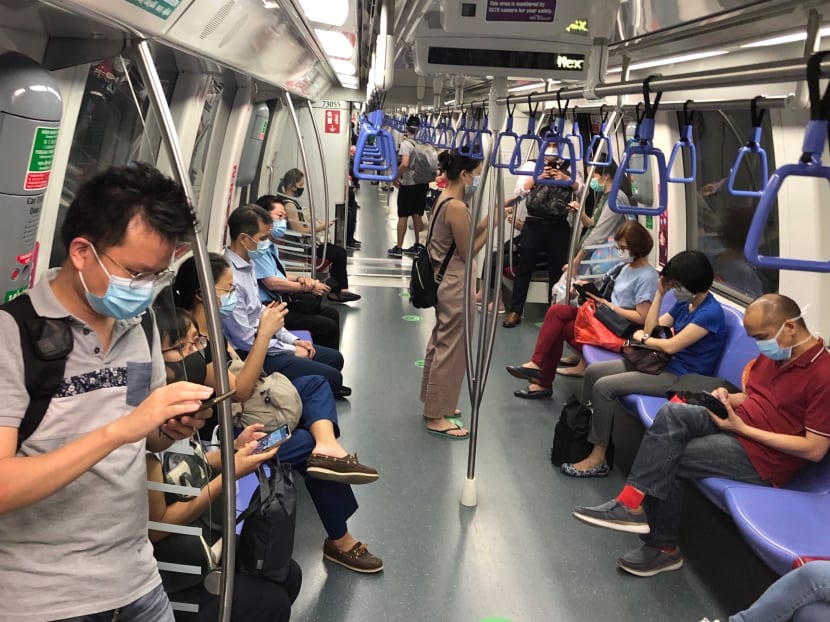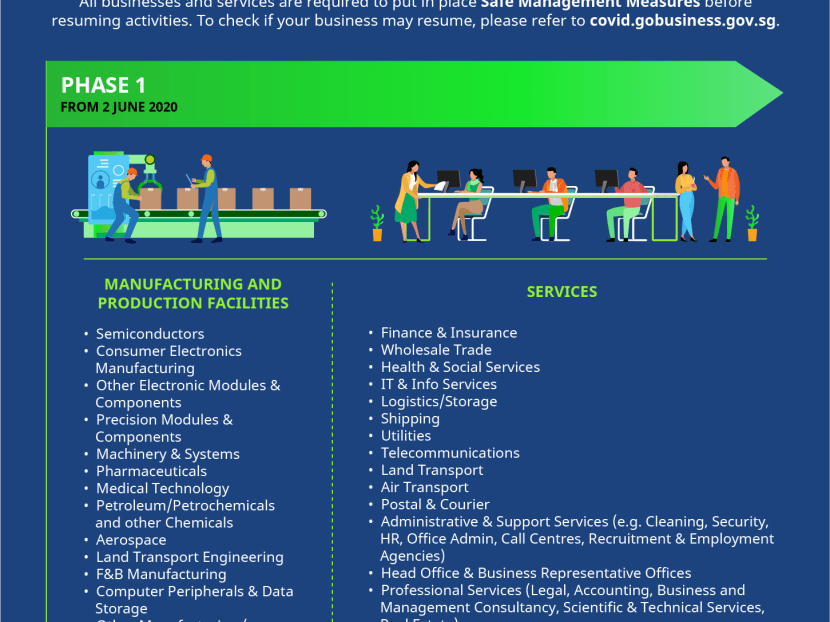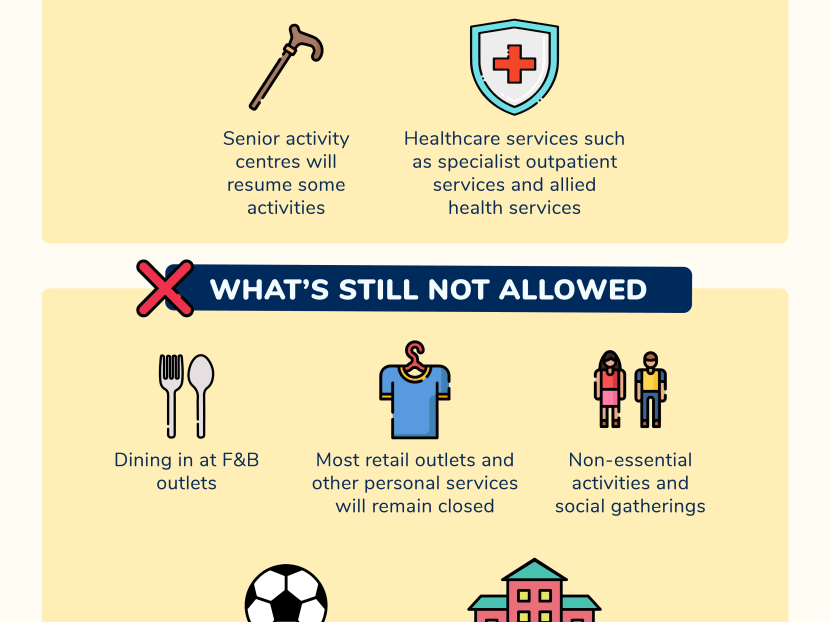Covid-19: How S’pore will exit the circuit breaker in 3 phases after June 1
SINGAPORE — The circuit breaker that was imposed to contain the spread of Covid-19 will be eased after June 1, and activities within the nation will be resumed gradually over three phases, the Ministry of Health (MOH) and the Ministry of Trade and Industry (MTI) said.

The multi-ministry task force handling the Covid-19 response in Singapore noted that the daily number of new community cases has declined significantly.
SINGAPORE — The circuit breaker that was imposed to contain the spread of Covid-19 will be eased after June 1, and activities within the nation will be resumed gradually over three phases, the Ministries of Health (MOH) and the Ministry of Trade and Industry (MTI) said.
The ministries said on Tuesday (May 19) that the governmental task force handling the Covid-19 response in Singapore had assessed the situation and noted that the daily number of new community cases has declined significantly, while the situation at foreign worker dormitories “has been stabilised” since the circuit breaker began on April 7.
The authorities have also prevented large clusters in the dormitories from spreading to the wider community, the ministries added.
The circuit breaker was imposed to get people to stay home. Social gatherings of anyone not from the same household were disallowed and non-essential businesses had to close, among other regulations.
However, as more economic activities and social interactions resume, the ministries warned that Singapore is likely to see a rise in new community cases.
“What is critical is our ability to detect and contain these cases quickly, and prevent large clusters from forming,” they said, warning that June 2 will not signal an immediate return to the normal life that Singaporeans were used to before the pandemic.
“We must get used to a new normal, with the widespread adoption of safe management measures and technology so that we can carry out our daily activities safely.”
The ministries outlined how the resumption of activities will be carried out over three phases.
PHASE ONE
This initial phase, which will start on June 2 and last at least four to six weeks, will see economic activities that “do not pose high risk of transmission” resuming.
Work
Most manufacturing and production facilities such as those in the semiconductors, pharmaceuticals and medical technology
Most businesses with employees working in offices or settings that do not require interactions with large groups of people, such as those in finance and insurance, wholesale trade, and health and social services
Selected services, namely, motor vehicle servicing, aircon servicing, basic pet services, school bookshops and retail shops selling school uniforms
Hairdressers and barbers will be allowed to resume offering all hairdressing services, beyond basic haircut services
All home-based businesses that operate using a delivery or collection model
MOH stressed that dining within food-and-beverage outlets will still be disallowed during this phase and that workers should continue to telecommute as much as possible.

Family
Singaporeans can now visit their parents or grandparents, though there will still be some restrictions
Each household should limit visits to one a day, and to receive not more than two persons, who must be from the same visiting household
Seniors should avoid doing house visits and let their children visit them instead
Community
Marriage solemnisation will be allowed to take place in-person again, involving up to 10 persons
Places of worship can reopen for private worship, with only up to five members of the same household praying together at any one time
Schools
Preschools will gradually reopen by levels from June 2, with full resumption by June 10
Students from graduating cohorts in the primary and secondary levels will attend school daily
Other cohorts will rotate weekly, alternating between home-based learning and returning to school for lessons
Junior colleges and Millennia Institute will arrange to have half of their students back in school at any one time
Students in the institutes of higher learning whose terms are in session will be able to return to campus for practical and laboratory-based sessions, with lectures remaining online
Co-curricular activities, enrichment activities and tuition will not resume
Student care centres will fully reopen on June 2, along with the reopening of schools
Healthcare
Healthcare services such as specialist outpatient services, medical procedures, allied health services, community-based services, and chronic disease management will resume
Preventive health services, such as flu vaccinations, will restart
Complementary healthcare services will resume for one-to-one sessions and by appointment, and traditional Chinese medicine needle acupuncture will be allowed for all conditions.
The current rules limiting the scope of services for seniors and senior-centric activities will remain, in order to protect them
Senior activity centres will gradually resume some activities in a “safe and controlled manner” to address the psychosocial well-being of seniors with little or no social support
Community-based centre services for persons with disabilities will also gradually reopen to serve those who need the services, with safe distancing measures in place
PHASE TWO
If community transmission rates remain “low and stable” and the situation at foreign worker dormitories remains under control during the first phase, then Singapore can move on to the second phase:
The gradual resumption of more activities such as social activities in small groups
Dine-in options at food-and-beverage establishments
Reopening of retail outlets, gyms and fitness studios, as well as tuition and enrichment centres
Reopening of sports, recreation and outdoor facilities
Speaking at a press conference on Tuesday, Health Minister Gan Kim Yong said that this phase may last several months.
Depending on the disease transmission and the authorities’ risk assessment, measures and regulations will continue to be eased gradually until Singapore reaches “a new normal” in the third phase, the ministries said.
This is a state in which Singapore can expect to remain until an effective vaccine or treatment for Covid-19 is developed, they added.
By this time, social, cultural, religious and business gatherings or events would have resumed, although gathering sizes would still have to be limited in order to prevent large clusters from arising
Seniors will also be able to resume day-to-day activities while practising safe distancing measures and avoiding crowded areas
Services and activities that involve significant prolonged close contact such as spas, and those that have a significant crowd management risk in an enclosed space, such as cinemas and nightclubs, will also be allowed to reopen
WHY REOPEN IN PHASES?
Explaining why Singapore is being reopened in phases, Mr Gan — an engineer by training — referred to how actual circuit breakers work at home.
He said that if there is a fault in the electrical system, the circuit breaker will kick in, the electrical switch will trip and everything is turned off. To find where the fault lies, the switches have to be turned on “slowly, one by one”.
To turn all of them on at the same time would only risk another short circuit.
Similarly, with Covid-19, he warned that Singapore cannot “turn on all the switches at same time” as it would only lead to another outbreak.
“So we have to be very careful,” he said. “As we restore some of the services and business activities, we also need to continue to observe to see which one particular activity is likely to create a (public health) problem.”
This will allow for “targeted measures” to be imposed to solve the problem, he added.
While he hopes that the authorities will be able to restore some level of normalcy, he warned that “life will not be as per normal as before the Covid-19 outbreak”.
Responding to a question on what are the considerations before Singapore can move on from one phase to another, Mr Gan said that the initial period will involve observing two cycles of incubation — or at least 28 days.
He said that this will allow the task force time to assess the impact of what it has introduced under the first phase before it contemplates moving on to the second phase.
As for the second phase, he said that it is a “transition phase” that may involve several steps and some measures may be relaxed earlier, while others continue.
Depending on how the situation evolves, this uncertain period may last for months.
When the final phase comes, he said that the country will be going through a “steady state, sustainable” situation where Singapore can be made safe, with some measures continuing to be in place.
“(This final phase) will be for quite some time for the long term until vaccines are available, or we are able to find a cure or the disease is no longer threatening.”
National Development Minister Lawrence Wong, who co-chairs the multi-ministry task force with Mr Gan, took to Facebook to thank "everyone who has worked hard over the past few weeks to bring down infection rates in the community".
"Because of our collective efforts, we can now exit the circuit breaker and resume activities in phases starting from June 2," he said.












